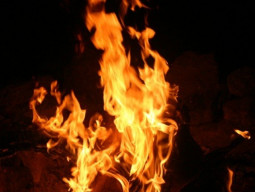
“We’re exhausted of narrating what happened to us,” said Hassan Channa, a flood survivor whose elder son died of hunger a few days ago in Jakhro Relief Camp near Khairpur Nathan Shah. His other son is also in terrible condition because there is no food to go around.
Fifty-year-old Channa, a resident of Khairpur Nathan Shah, is among thousands who lost their homes and livelihoods when their city was flooded.
For the 500 families living in the relief camp, lack of food was the biggest issue.
Hasina Sheikh said she did not want the spaghetti donated by an NGO. “But we’ll appreciate it if someone can give us daal, roti or even lassi,” she added.
Most of the people in the camp belonged to KN Shah, which was once a bustling city of over 60,000. It is now akin to a ghost town stranded in a sea of floodwater.
All the markets are closed. “Please help us and save the city of the martyred” read slogans scrawled the monument established in the memory of those people who died in the struggle for restoration of democracy in the 1980s.
The Indus Highway from Johi Branch was still inundated, and traffic to and from Larkana severely affected. The only vehicles brave and big enough to travel the road are tractor trolleys. Other than the main bazaar, almost every corner of the town had been affected by the flood. The stench of stagnant water is everywhere and basic health centres, hospital, schools, shops and rice mills which were flooded have yet to be cleaned up.
EDO Revenue said they have set up pumping stations in different areas of KN Shah to drain out water and it will take two more weeks to finish. “We received Rs93 million for relief and rescue services for the district but the total expenditure of the district government is already Rs139 million. We need more money to continue relief activities and to drain out water from the cities,” he said.
Talking to The Express Tribune, Medical Officer Taulka Hospital said since the hospital was inundated, they started looking at their out patients in the community centre.
“We treat around 200 patients on an average every day. Most of them are suffering from diarrhoea and vomiting, many are from different villages and camps around the city,” he said.
The most crowded and lively area was where the shops of scrap dealers were located. Scores of residents gathered to sell pieces of their houses and appliances that had been damaged in the flood.
There were also several people holding documents as they waited for officials carrying out loss assessments.
But Shahnawaz Zangejo, a social activist, is not happy with the administration. “We promise not to cast a vote for them [PPP] in the upcoming elections because they have deliberately flooded our city,” he said.
Meanwhile, Zaffar Junejo, Chief Operating Officer Thardeep Rural Development Programme (TRDP) said 31 union councils, 1,409 villages have been affected in Dadu district. Meanwhile, 791,900 people have been displaced and 1,785 livestock have been washed away. He said that along with KN Shah, Ghozo, Fatehpur towns of Dadu and Bhan Saeedabad, Boobak, Jhangara of Jamshoro district are still under water. He said the government is not making enough efforts to drain the floodwater from these areas.
“Can you imagine that we started a door-to-door campaign and asked people to contribute only one kilogramme of flour for flood survivors, which resulted in collection of around Rs3 million? Elected representative and political parties can also play their part but there is a lack of political will,” he said.
The worst affected area of KN Shah, where several houses collapsed, included Shahbaz Colony, Jokia Muhalla, Nawabad Colony, Nathan Shah Muhalla, Karimdad Lund Colony, Korai Muhallah and Golimar Colony.
“I always dreamt of owning a house and after spending 10 years working in Saudi Arabia I finally built my three-room house one year ago,” narrated Ghulam Farid Shaikh, resident of Jokia Colony. “But now it is completely damaged.”
Published in The Express Tribune, October 27th, 2010.


1723278472-0/BeFunky-collage-(4)1723278472-0-165x106.webp)














COMMENTS (2)
Comments are moderated and generally will be posted if they are on-topic and not abusive.
For more information, please see our Comments FAQ